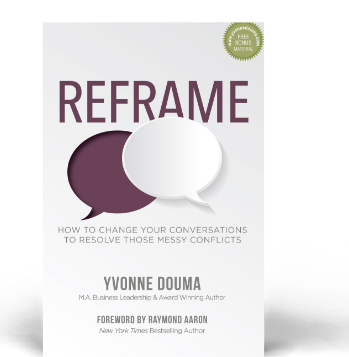Social awareness is one of the most important tools to have in your toolkit if you want to have healthy relationships and a happy life. It’s also critical if you want to avoid conflicts at work and navigate a successful career.
That’s why helping clients understand and improve their social awareness is one of the key elements in my executive coaching and small business education programs. It’s also a big focus of my new book, REFRAME.
So what exactly is social awareness, and how can it help you in your day-to-day life and career? Keep reading!
What Is Social Awareness?
Simply put, social awareness means being aware of the people around you. Body language and tone of voice make up 93% of all communication. Social awareness includes tuning into the subtle cues of those around you, moving beyond what they’re saying to what they’re actually doing.
Social awareness flows from self-awareness, which includes both being in tune with your own communication issues and behavioural habits, and with your unique personal history that helped form them.
Self-awareness requires you to become aware of your personality, habits, likes, dislikes, needs, behaviours, goals, strengths, successes, and failures. And once you understand your own triggers and how they affect you, you can better start to understand that other people have their own triggers, and their own reactions to them.
It sounds simple, but trust me: good social awareness is the new superpower.
Why Social Awareness Is So Helpful At Work
When you are having a conversation with someone at work, do you instinctively pick up on their changing body language? Do you notice if they suddenly cross their arms (taking a defensive stance), have an annoyed expression on their face, grind their teeth, exhale loudly, or tap their foot?
These are all (not-so-subtle) signs that something is up. Do not ignore them.
Now, their behaviour could be due to something innocuous, like they’re late for an appointment and don’t have time to talk to you. Or it could mean that something you are saying is annoying them. Either way, now is probably not the best time to keep pressing forward with your conversation – they’re just not going to listen and respond the way you’d like.
Instead, pick up on their cues. It’s ok to ask if you are keeping them from something. This will allow them to end the conversation. And, just as important, it will allow you to pick up your conversation at a time when they’re more likely to hear you.
And how are you when approaching a new group of people? As you enter the room, pay attention. Do the people look upbeat and happy, or is the mood solemn or serious?
When you’re entering into a new group of people or event, it’s usually a good idea to make sure your body language is either neutral or matches theirs. So if you enter a meeting where everyone is joking and laughing, you know this will be a light, fun interaction. Feel free to join in the fun!
However, if you notice most people have negative or defensive body language, or you can feel the tension in the air, be mindful it will be a more sensitive environment. Be careful with your words and how you present yourself.
And as you become more socially aware and pick up on the negative body language of a select few in the group, you can position yourself away from them. Instead, seat yourself next to the people whose energy naturally matches yours.
Body language is nonverbal communication, including facial expressions, posture, gestures, eye movements, sense of space, and touch. The thing is, body language is often subconscious. You do not know you are doing it, and the people around you don’t know they are doing it. The recipe for success is to look for cues, be aware of others, and manage yourself.
You Don’t Have To Lose Yourself
To manage your relationships with others, it all starts with you. Only when you are self-aware can you be conscious of how others are perceiving you – so critical when you’re trying to advance in your career.
And when you know how to read other people, you can more easily get a sense of their mood and how open they might be to having that difficult conversation or listening to your great new idea.
Everyone is unique, and not everyone has to like you (repeat that to yourself over and over, until it sticks!).
That said, they need to accept you and treat you with respect. Part of that comes from being aware of your own attitude at work (positive or negative) and how you’re presenting yourself.
But that said, don’t fall into the trap of losing yourself in the process. Just because the room is serious, you can still be the happy, silly person that you are. This isn’t about changing who you are, it’s about recognizing who other people are, too.
So continue to be kind and considerate. Promise me that you will not change the awesomeness you are.
But promise me, too, that you’ll start to think of your career and your relationships as precious cargo that needs to be nurtured.
Finally, if you found this article helpful, I think you’ll also like my new book, REFRAME. Reaching #1 best-seller status on Amazon on its first day, it’s your blueprint to better communication skills, with simple yet powerful tools that will help you connect better with others, grow your career and lead an easier, happier life. Get it here.

